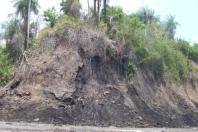Extreme Extraction comes to Morocco?
Extreme Extraction
Oil production plans could reshape Morocco's economy and environment
RABAT, MOROCCO—Many well-known voices trying to address the global climate crisis have posited that less-developed countries—those without a full-blown industrial base—can skip industrialization all together and transition away from fossil fuels. If that is achieved, development in those countries would ideally result in the construction of infrastructure suitable for a post-fossil fuel society.
But if Morocco is any indication, the opposite scenario appears more likely to happen. Instead of proceeding with climate-friendly energy developments, Morocco is poised to begin extracting crude oil from unconventional deposits—the dirtiest fuel available. Mining rock for oil in Morocco would leave massive craters in post-fossil, green energy hopes.
Morocco, like Jordan and Israel, is moving towards using the most carbon intensive fuel base on earth. This move is supported by present, and projected, oil prices that make synthetic crude from oil shale profitable on a near permanent basis. Technology has become cheaper while the price of oil has gone up dramatically. Recent industry estimates indicate that oil can now be extracted from shale for approximately US$40 per barrel, while the average price at an American pump is US$94 per barrel.
With global oil demand slated to grow, Morocco is set to become an unconventional oil producer through mining oil shale and converting it to mock crude oil in a fashion similar to Canadian tar sands development, but borrowing on shale technology from Brazil. Morocco also has contracts to use Estonian technology to mine and burn oil shale directly for domestic electricity.
Estonia is one of a few countries in the world that has ongoing oil shale currently in operation. The Tangier deposit of oil shale in the north of Morocco is likely to see Eesti Energy-owned Enefit of Estonia work to mine this shale directly for domestic electricity generation, which would treat the kerogen shale more like a cousin of coal rather than an ancestor of oil.
Petrobras, the Brazilian state-owned oil company, has developed a technique of extracting oil as well as gas from oil shale, and has been involved in this process commercially since the early 1980s. A partnership between Petrobras and TOTAL energy of France has been developing towards shale-to-oil mining at the Timahdit deposit, a deposit much larger than Tangier, approximately 240 kilometres southeast of Rabat, Morocco’s capital. Petrobras would be the main operator of the Timahdit mine, but both world energy majors will share the costs and profits.
However, there is one persistent problem for both these projects: water. Even without proposed oil shale mining and in-situ developments, Morocco has a serious potable water problem.
To operationalize oil shale in Morocco, water would need to be sourced from nearby the Timahdit deposit. Throughout the country, waterways are already becoming silt-ridden as erosion slowly manifests as a result of another ecological tragedy in the area: illegal timber harvests.
Some environmental journalists, like Mohammed Attaoui, have recently landed directly in the crosshairs of the Moroccan Kingdom. Attaoui was imprisoned by the Moroccan government after he investigated ongoing illegal timber marketing and exporting. Although Attaoui was officially charged and convicted in March 2010 for the extortion of 1,000 dirham (approximately US$120), critics maintain Attaoui was set up in a ploy timed immediately after his research into the country's “cedar mafia” had been published. He was handed a two-year sentence for his alleged crime.
Deforestation, destructive in its own right, is without doubt one of the major factors furthering the water crises of Morocco. But if the water needs for running a major mining operation are appended onto the existing crisis, the prognosis for the country's environmental health gets ever bleaker. The proposed mine at Timahdit happens to be in the same region as two national parks: the Ifrane National Park, which is already under threat from the illegal timber harvest, and Haut Atlas Oriental, which is home to tens of thousands of small farmers who rely on the area and its habitat for agriculture and subsistence.
The illegal timber harvest is the primary threat to the macaques, the last remaining large population of monkeys in northern Africa. Primarily living in the Ifrane National Park, macaques used to be common throughout the Mahgreb but are now endangered by loss of habitat elsewhere and by the shrinking forest. The only place outside Morocco where they live is in the small and shrinking Djebel Babor Nature Reserve on Algeria's coast. According to The Morocco Board News Service, the region is also home to more than 200 forms of plant life not found anywhere else.
Oil extraction is but another burden in a region defined by an already fragile environment. Between the three proposed sites for shale oil development in Morocco, early projections indicate that 50,000 barrels per day of mock oil could be produced for conversion into various fuels within a few years. (This figure does not include electricity generation where shale is burned in a similar fashion to a coal fired plant.)
That estimate includes the Tarfaya deposit near Morocco's border with the nominally independent Western Sahara, which is still occupied by Moroccan forces. Tarfaya has also just seen the completion of an in-situ pilot project constructed by San Leon Energy of Ireland, a smaller player with some operations in the continental United States. Building up Tarfaya has already meant the construction of major highways in less populated parts of southern Morocco to allow for the transport of supplies and materials for the project.
Morocco is on its way to becoming a testing ground for unprecedented oil shale extraction. “The environmental issues in places such as Colorado are not an issue in Morocco,” John Buggenhagen, San Leon Energy’s vice-president of exploration, told Petroleum Economist.
This article is the third in a four-part series examining unconventional oil deposits in the Middle East and North Africa. The series was originally published on the Media Co-op.


